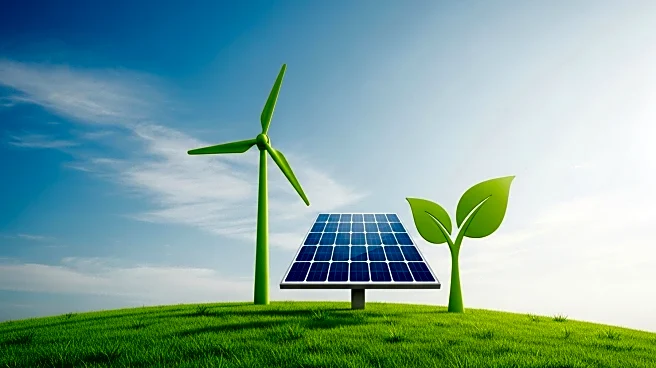What's Happening?
The European Union has announced a substantial investment package totaling $638 million aimed at enhancing renewable energy infrastructure across Africa. This initiative is designed to support electrification efforts, modernize power grids, and improve access to renewable energy sources. Key investments include $420 million allocated for a high-voltage power line in Côte d’Ivoire to enhance regional energy distribution, $69 million for rural electrification projects in Cameroon, and $53 million to increase access to affordable renewable energy in Somalia. The European Commission highlighted the continent's significant renewable energy potential, noting that nearly 600 million people in Africa currently lack access to electricity. The investment is expected to create up to 38 million green jobs by 2030.
Why It's Important?
This investment by the European Union is crucial for addressing energy poverty in Africa, where a significant portion of the population remains without access to electricity. By modernizing power grids and expanding renewable energy infrastructure, the initiative aims to foster sustainable development and economic growth across the continent. The creation of millions of green jobs will not only boost local economies but also contribute to global efforts in combating climate change by reducing reliance on fossil fuels. This move underscores the EU's commitment to supporting Africa's transition to renewable energy, which is vital for achieving long-term environmental and economic sustainability.
What's Next?
The implementation of these projects will likely involve collaboration between African governments, local communities, and international stakeholders to ensure successful execution and sustainability. As the projects progress, there may be increased opportunities for further investments and partnerships aimed at expanding renewable energy access across Africa. Monitoring and evaluation mechanisms will be essential to assess the impact of these investments on energy access and job creation. Additionally, the EU's initiative may encourage other international entities to invest in Africa's renewable energy sector, further accelerating the continent's energy transition.
Beyond the Headlines
The EU's investment in Africa's renewable energy sector could have broader implications for international relations and global energy markets. By supporting Africa's energy transition, the EU is positioning itself as a leader in global climate action, potentially influencing other regions to adopt similar strategies. This initiative may also strengthen diplomatic ties between Europe and Africa, fostering cooperation in other areas such as trade, technology, and education. Furthermore, the focus on renewable energy aligns with global efforts to reduce carbon emissions and mitigate the impacts of climate change, contributing to a more sustainable future.










